中考状元笔记新目标九年级英语7
- 格式:doc
- 大小:1001.00 KB
- 文档页数:13
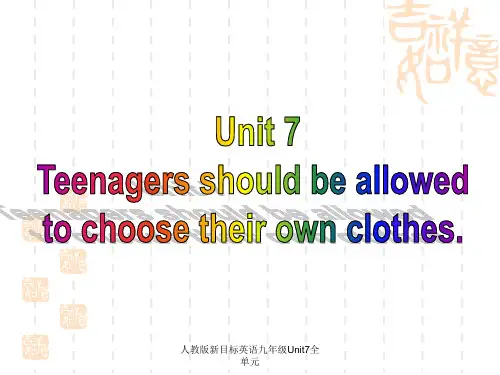

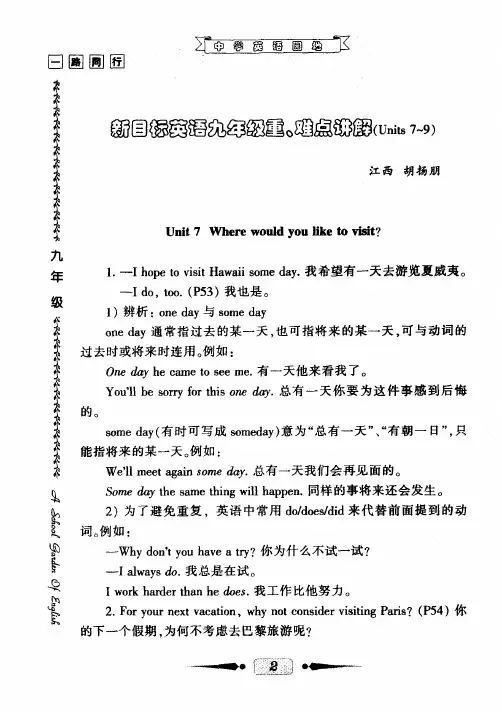
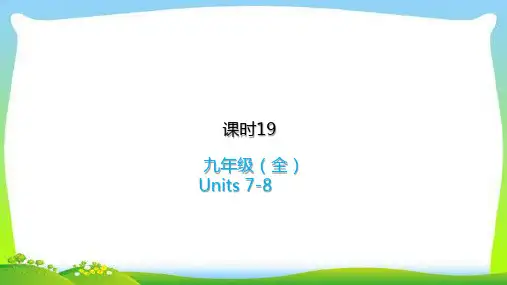
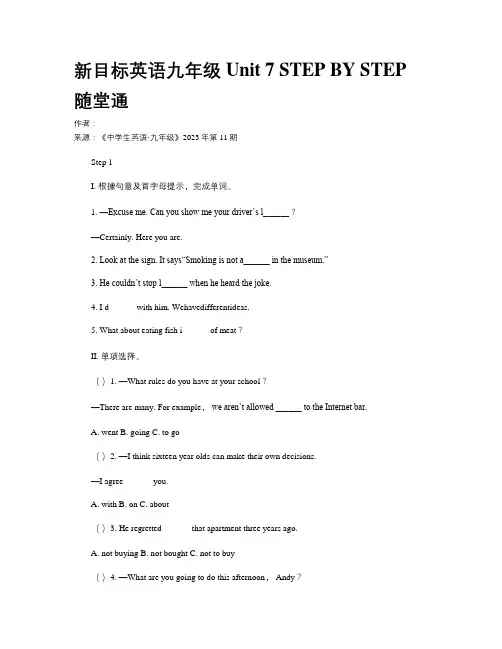
新目标英语九年级Unit 7 STEP BY STEP 随堂通作者:来源:《中学生英语·九年级》2023年第11期Step 1I. 根據句意及首字母提示,完成单词。
1. —Excuse me. Can you show me your driver’s l______?—Certainly. Here you are.2. Look at the sign. It says“Smoking is not a______ in the museum.”3. He couldn’t stop l______ when he heard the joke.4. I d______ with him. Wehavedifferentideas.5. What about eating fish i______ of meat?II. 单项选择。
()1. —What rules do you have at your school?—There are many. For example,we aren’t allowed ______ to the Internet bar.A. wentB. goingC. to go()2. —I think sixteen year olds can make their own decisions.—I agree ______ you.A. withB. onC. about()3. He regretted ______ that apartment three years ago.A. not buyingB. not boughtC. not to buy()4. —What are you going to do this afternoon, Andy?—My hair is too long. I want to get my hair ______.A. cutB. to cutC. cuts()5. —Have you finished your work?—No,not yet. I think it’ll take ______ two hours.A. otherB. elseC. another()6. —Let’s go swimming in Hanjiang River after school.—No way! Our parents must ______ our safety if we do.A. talk aboutB. think aboutC. worry aboutStep 2I. 用括号内所给单词的正确形式填空。
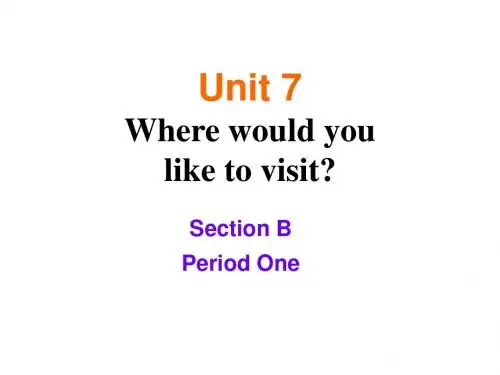
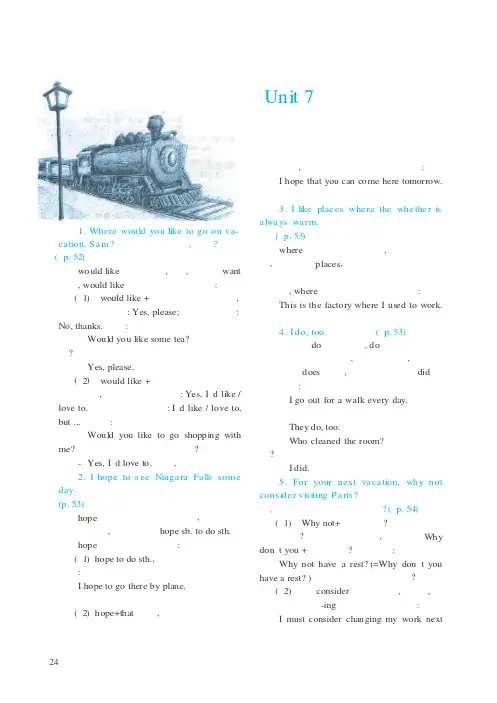
1.Where would you like to go on va-ca tion,Sa m?你想去哪儿度假,萨姆?(p.52)would like意为“愿意,想”,与动词want 同义,would like主要有以下两种用法:(1)“would like+名词”表示征求意见,其肯定答语常为:Yes,please;否定答语为: No,thanks.例如:—Would you like some tea?您想喝些茶吗?—Yes,please.想。
(2)“would like+动词不定式”表示邀请或建议,肯定答语通常为:Yes,I’d like/ love to.否定答语通常为:I’d like/love to, but...。
例如:—Would you like to go shopping with me?你愿意和我一起去买东西吗?-Yes,I’d love to.是的,非常乐意。
2.I hope to s ee Niaga ra Fa lls some day.我希望有一天能去看尼亚加拉大瀑布。
(p.53)hope作动词用时意为“希望”,其后不能接复合宾语,即不能接hope sb.to do sth.结构。
hope的句型主要有两种:(1)hope to do sth.,表示“希望做某事”。
例如:I hope to go there by plane.我希望坐飞机去那儿。
(2)hope+that从句,它强调的希望往往是客观的,一般可以实现的意愿。
例如:I hope that you can come here tomorrow.我希望你明天能来这儿。
3.I like plac es whe re the whe the r isa lwa ys wa rm.我喜欢天气总是暖和的地方。
(p.53)where在这里是关系副词,引导定语从句,修饰名词places,它所引导的定语从句所修饰的先行词一般是表示处所或场所的地点名词,where在从句中作状语。
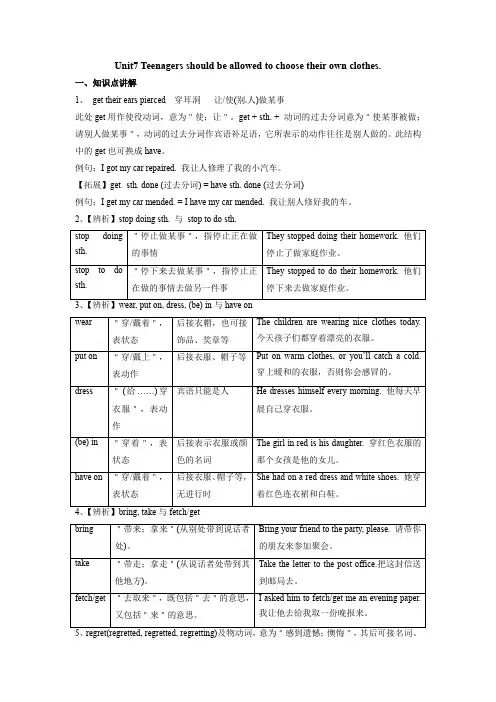
Unit7 Teenagers should be allowed to choose their own clothes.一、知识点讲解1、get their ears pierced 穿耳洞让/使(别人)做某事此处get用作使役动词,意为"使;让"。
get + sth. + 动词的过去分词意为"使某事被做;请别人做某事",动词的过去分词作宾语补足语,它所表示的动作往往是别人做的。
此结构中的get也可换成have。
例句:I got my car repaired. 我让人修理了我的小汽车。
【拓展】get sth. done (过去分词) = have sth. done (过去分词)例句:I get my car mended. = I have my car mended. 我让别人修好我的车。
2、【辨析】stop doing sth. 与stop to do sth.代词、that/what 引导的从句、动词-ing 形式或动词不定式作宾语。
例句:If you don’t do it now, you’ll regret it. 如果你现在不做,你会后悔的。
例句:I regret what I said. 我非常后悔说了那些话。
【辨析】regret doing sth. 与 regret to do sth.四"记"力争不后悔。
四记指"remember 记得/记住;forget 忘记;mean 计划/打算;go on 继续"。
力争指"try 努力/尽力"。
不后悔指"stop 停止;regret 遗憾/后悔"。
6、allow v . 允许;准许(1) allow sb. to do sth.允许某人做某事例句:Tom doesn’t allow her son to play computer games on school nights.汤姆不允许她儿子在上学的夜晚玩电脑游戏。
(2) be (not) allowed to do sth. (不)被允许做某事例句:Passengers are not allowed to smoke. 乘客不允许吸烟。
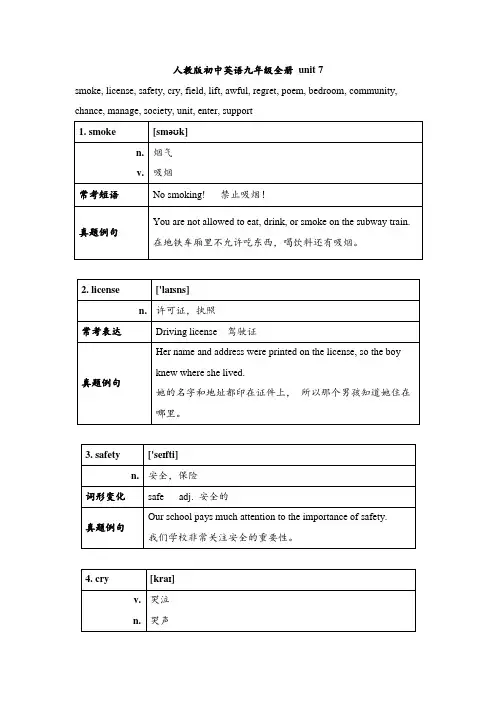
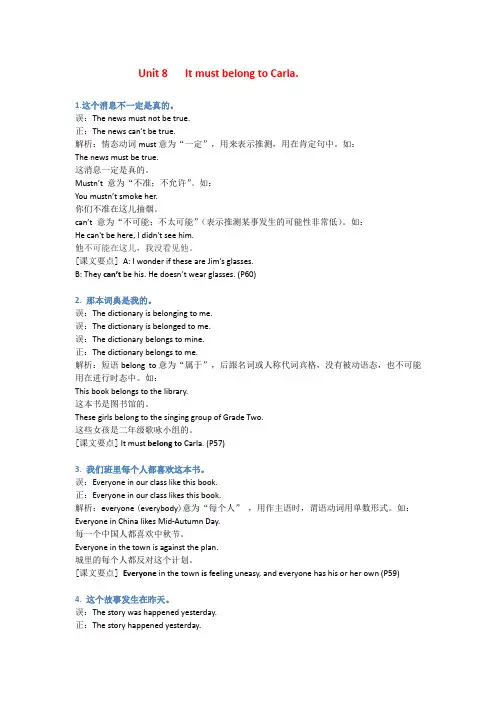
Unit 8 It must belong to Carla.1.这个消息不一定是真的。
误:The news must not be true.正:T he news can’t be true.解析:情态动词must意为“一定”,用来表示推测,用在肯定句中。
如:The news must be true.这消息一定是真的。
Mustn’t 意为“不准;不允许”。
如:You mustn’t smoke her.你们不准在这儿抽烟。
can’t 意为“不可能;不太可能”(表示推测某事发生的可能性非常低)。
如:He can't be here, I didn't see him.他不可能在这儿,我没看见他。
[课文要点]A: I wonder if these are Jim’s glasses.B: They can’t be his. He doesn’t wear glasses. (P60)2. 那本词典是我的。
误:The dictionary is belonging to me.误:The dictionary is belonged to me.误:The dictionary belongs to mine.正:The dictionary belongs to me.解析:短语belong to意为“属于”,后跟名词或人称代词宾格,没有被动语态,也不可能用在进行时态中。
如:This book belongs to the library.这本书是图书馆的。
These girls belong to the singing group of Grade Two.这些女孩是二年级歌咏小组的。
[课文要点] It must belong to Carla. (P57)3. 我们班里每个人都喜欢这本书。
误:Everyone in our class like this book.正:Everyone in our class likes this book.解析:everyone (everybody)意为“每个人”,用作主语时,谓语动词用单数形式。
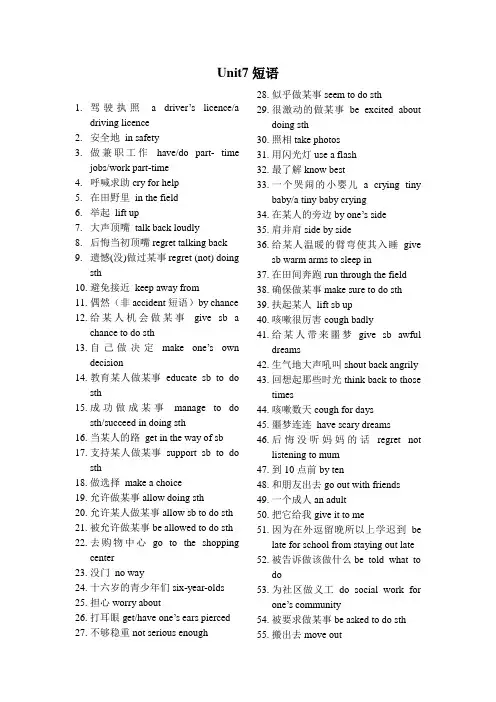
Unit7短语1.驾驶执照 a driver’s licence/adriving licence2.安全地in safety3.做兼职工作have/do part- timejobs/work part-time4.呼喊求助cry for help5.在田野里in the field6.举起lift up7.大声顶嘴talk back loudly8.后悔当初顶嘴regret talking back9.遗憾(没)做过某事regret (not) doingsth10.避免接近keep away from11.偶然(非accident短语)by chance12.给某人机会做某事give sb achance to do sth13.自己做决定make one’s owndecision14.教育某人做某事educate sb to dosth15.成功做成某事manage to dosth/succeed in doing sth16.当某人的路get in the way of sb17.支持某人做某事support sb to dosth18.做选择make a choice19.允许做某事allow doing sth20.允许某人做某事allow sb to do sth21.被允许做某事be allowed to do sth22.去购物中心go to the shoppingcenter23.没门no way24.十六岁的青少年们six-year-olds25.担心worry about26.打耳眼get/have one’s ears pierced27.不够稳重not serious enough 28.似乎做某事seem to do sth29.很激动的做某事be excited aboutdoing sth30.照相take photos31.用闪光灯use a flash32.最了解know best33.一个哭闹的小婴儿 a crying tinybaby/a tiny baby crying34.在某人的旁边by one’s side35.肩并肩side by side36.给某人温暖的臂弯使其入睡givesb warm arms to sleep in37.在田间奔跑run through the field38.确保做某事make sure to do sth39.扶起某人lift sb up40.咳嗽很厉害cough badly41.给某人带来噩梦give sb awfuldreams42.生气地大声吼叫shout back angrily43.回想起那些时光think back to thosetimes44.咳嗽数天cough for days45.噩梦连连have scary dreams46.后悔没听妈妈的话regret notlistening to mum47.到10点前by ten48.和朋友出去go out with friends49.一个成人an adult50.把它给我give it to me51.因为在外逗留晚所以上学迟到belate for school from staying out late 52.被告诉做该做什么be told what todo53.为社区做义工do social work forone’s community54.被要求做某事be asked to do sth55.搬出去move out56.在18岁时at the age of 18/at 1857.就这样/这样一来this way58.料理自己的生活manage one’s ownlives59.在大多数亚洲社会中in most Asiansocieties60.对某人来说做某事很普遍it iscommon for sb to do sth61.继续做另件事(=go on to do)continue o sth62.继续做同一件事(=go on doing)continue doing sthUnit 7 Section B phrases: 1.上课迟到be late for class/get to class late/come to class late/arrive late for class2.提早完成考试finish a test early3.担心be warried about/worry about4.参加考试take a test5.通过考试pass a test6.数学考试不及格fail the math test7.延后参加考试take the test later8.严格的规定strict rules9.对某人要求严格be strict with sb10.对某事要求严格be strict in sth/doing sth11.妨碍他们的学业get in the way of their schoolwork12.练习做某事practice doing sth13.尽可能多的练习他们的爱好practice their hobbies as much as they want/practice their hobbies as much as possible14.一个来自山东的15岁男孩 a 15-year-old boy from Shandong15.一个赛跑明星a running star16.是校队一员be on the school team17.一个专业赛跑者 a professional runner18.成长grow up/get older19.训练如此频繁train so much20.实现某人的梦想achieve one’s dream21.他多么热爱赛跑啊!how much he loves running22.一个专业体育明星 a professional sports star23.并不反对做某事have nothing against running24.最终成为end up as25.为我自己做决定decide/make a decision for oneself26.自己做决定make one’s own decision(s)27.做某事是有多么重要啊!How important it is to do sth27.考进大学enter university28.上大学go to college29.对做...认真,对做...极感兴趣be serious about sth/doing sth30.我曾想去做的唯一的事情the only thing I’ve ever wanted to do31.在某事上花更多的时间/金钱spendmore time/money on sth32.花时间做某事spend time doing sth33.做某事很困难it’s hard for sb to do sth34.一名专业的体育明星a professional sports star35.关心、在乎care about36.一个很快的赛跑运动员 a quick runner37.只有那样,我才有机会实现我的梦想Only then will I have a chance to achieve my dream38.不管我们有多少困难No matter how many difficulties we have39.保持关机be kept off40.做兼职工作work part-time。
人教版新目标九年级英语全册学习笔记Unit 1: Hello!Lesson 1: Greetings- Different countries and cultures may have specific greetings.Lesson 2: Introductions- Introducing oneself is a basic skill in social interactions.- Introductions usually include stating one's name, age, and hobbies.Unit 2: School LifeLesson 1: School Subjects- Subjects such as Mathematics, English, Science, and History are taught in schools.- Each subject has its own unique characteristics and importance.- Studying different subjects enables students to gain a broad knowledge base.Lesson 2: School Facilities- Schools have various facilities to support students' learning.- These facilities provide students with a conducive learning environment.Unit 3: Hobbies and InterestsLesson 1: Hobbies- Hobbies are activities people do for enjoyment and relaxation.- Examples of hobbies include playing sports, reading books, and playing musical instruments.- Hobbies can help individuals develop new skills and discover their interests.Lesson 2: Free Time- Free time refers to the time outside of school or work.- People engage in different activities during their free time.- It is important to make good use of free time for personal growth and leisure....(Continue with the remaining units and lessons)Conclusion。